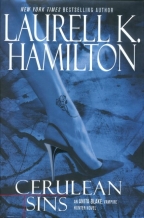Cerulean Sins
Laurell K. Hamilton
Berkley Publishing Group
US Hardback
ISBN: 0-425-18836-1
Pages: 416; Price: $22.95
Date Reviewed: 6th April 2003
Reviewed by: Serena Trowbridge © 2003

REFERENCES
COLUMNS
|
|
|
Cerulean SinsLaurell K. HamiltonBerkley Publishing GroupUS HardbackISBN: 0-425-18836-1Pages: 416; Price: $22.95Date Reviewed: 6th April 2003Reviewed by: Serena Trowbridge © 2003 |
|
|
REFERENCES |
COLUMNS |
Vampire politics and wererats abound in Cerulean Sins, the 11th book in the series of Anita Blake - Vampire Hunter novels. Anita Blake, still torn between her two vampire lovers, is caught up in a strange zombie-raising incident, which appears to lead to a succession of brutal murders, taking on a wide variety of bad guys along the way. The storyline seems to fall neatly into two parts: the cops, who have their internal politics and their own concerns, and the monsters, ranging from vampires to werewolves, whose politics are equally complicated. Most of the book, however, is taken up with Ms Blake feeding her "ardeur" and exhausting all the men in the vicinity along the way, which is presumably what makes the books so resoundingly popular. Certainly this is the key element of the plot; and while I have no objection to sex as a method of moving a plot forward, this is neither relevant nor believable or enjoyable.
The plot has an interesting structure with what could be described as a moral framework; Anita Blake claims that she is a good girl at heart (although to be fair we see little evidence of this) and Freud would have had a field day with a plot which has every sex scene followed by a scene of gorily horrible murder victims. This sense of ethical retribution that is lent to the plot is not echoed in the characters, however, as most of them are largely unempathetic and one-dimensional. Sex and death can create an atmosphere for the perfect metaphysical plot, but although there is plenty of both here, somehow the plot misses the mark. Fans of the series will see this latest book as a chance to catch up with characters from earlier in the series, however, as Anita struggles to define her emotions for the men in her life.
The strongest point of the novel, however, has to be the scene-setting; the gothic atmosphere in which vampire politics are conducted, along with the lovingly described costumes and the detailed interiors place the book firmly in the category of gothic novels, but sadly the plot is neither suspenseful nor chilling enough to maintain this impression. It is a pity that the careful construction of the world of Anita Blake is spoiled by poor characterization and a weak plot, but fans of her previous novels will enjoy the development of the political world of vampires and were-animals.
The first ten books have been well received by the public, if not by critics, but it is difficult to see why. I have to admit, however, that I reveled in the triumphantly bad prose of this novel. Neither in dialogue (of which there is a lot) nor in narrative does Laurell Hamilton show any awareness of how people really speak, or indeed of conventional grammar, which at first was surprisingly refreshing, but turned out to be unusually irritating. In a recent interview, Ms Hamilton explained that Raymond Chandler had been a big influence on her writing, and her attempts to follow his prose style are evident throughout, but sadly she does not have Chandler's inimitable mastery of the language.